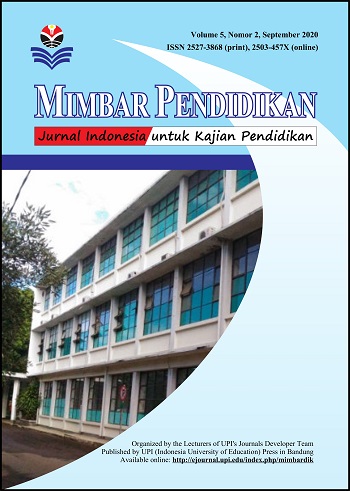MIMBAR PENDIDIKAN: Jurnal Indonesia untuk Kajian Pendidikan (Indonesian Journal for Educational Studies)
This journal was first published on March 11, 2016, and it is issued every March and September. MIMBAR PENDIDIKAN is a new version of the old journal with the similar name that was published from 1995 to 2005. This journal is dedicated not only for Indonesian scholars who are concerned with educational studies, but also for scholars of Southeast Asian countries and around the world who care and want to share thoughts and ideas related to educational studies in general.
MIMBAR PENDIDIKAN journal is organized by the Lecturers of UPI (Universitas Pendidikan Indonesia's Journal Developer Team); and is published by UPI Press,Bandung, West Java, Indonesia. The articles published in MIMBAR PENDIDIKAN can be in English, Indonesian or Malay language.
MIMBAR PENDIDIKAN journal is devoted, but not limited to, primary education, secondary education, higher education, teacher education, special education, adult education, non-formal education, and any new development and advancement in the field of education. The scope of our journal includes: (1) Language and literature education; (2) Social sciences and humanities education; (3) Sports and health education; (4) Economy and business education; (5) Math and natural science education; (6) Vocational and engineering education; and (7) Visual arts, dance, music, and design education.
Conventional e-mail address for sending the articles is: asepridwan@upi.edu
Volume 5(2), September 2020.

The Founder of MIMBAR PENDIDIKAN Journal in Bandung, since 1986; the last Rector of IKIP (Institute of Education and Teacher Training) Bandung for Period 1995-2000; and the first Rector of UPI (Indonesia University of Education) in Bandung for Period 2000-2005. E-mail: mfgaffar@gmail.com
It was in 1974, a time when HEIs (Higher Education Institutions) in Indonesia was difficult and even rare for having a scientific journal, including for IKIP (Institute of Education and Teacher Training) Bandung, now UPI (Indonesia University of Education). A Bulletin was the only printed media available in IKIP Bandung for communicating important matters about IKIP Bandung to the public internally and externally.
In 1986, the time of Bulletin ended, it was the time when a young and energetic Acting Assistant of Rector took office. He brought about new thinking about IKIP Bandung, the needs for change and move forward as an estabished HEIs focussing on the education of teachers. Bulletin was inadequate, there had to be a respectable publication in which academicians of IKIP Bandung could exchange ideas and present results of researches and innovations in the most respectable manner. A scientific journal was considered most appropriate. “MIMBAR PENIDIKAN” as a respectable scientific journal of education emerged.
The title of “MIMBAR PENDIDIKAN” was retained, because “MIMBAR” means a place where an academician stood and talked with full authority in his/her area of academic specialization and presented ideas and innovations to other academicians in a respectable academic forum. Scientific authority was exhebited and shared through this “MIMBAR”. So, “MIMBAR” is a podium in an academic forum, where a scientist share his/her brilliant innovations and his/her research findings to the audiences in the academic forum. The term of “PENDIDIKAN” is meaning on Education. In this context, Education was not only related to the education of teachers as the main mission of IKIP Bandung at that time, but also included a wider and broader perspectives that were the education of all aspects of human mankind without discrimination of any kind.
“MIMBAR PENDIDIKAN” was gradually accepted as the only scientific journal of IKIP Bandung, in which faculty members could share ideas, results of researches, and innovations among faculty members of IKIP Bandung; and, at the same time, as a scientific forum for communicating results of researches and innovations to higher education community and particularly to all faculty members and students of IKIP Bandung and of other teacher education institutions across the Indonesian country.
The period of 1986 to 2005 was the period of change and progress. It was during the period when IKIP Bandung became UPI (Universitas Pendidikan Indonesia or Indonesia University of Education), the only national education university in Indonesia. The journal of MIMBAR PENDIDIKAN was well known, particularly among teacher education institutions in the Indonesian country. MIMBAR PENDIDIKAN was a national journal on education, which had been accredited several times.
The year of 2005 was the time when leadership of the university changed and a new leader took power with his ideas and priorities. Unfortunately, the scientific journals were not on his priority list and, therefore, the last accreditation of MIMBAR PENDIDIKAN journal ended in 2007. From that year, UPI in Bandung had gone through a time of silent. The MIMBAR PENDIDIKAN journal had also gone into ashes. There was no single accredited institutional journal of any kind produced by UPI, in the university level, for many years; exceptly one scholarly journal published by the Department or Study Program level, namely “HISTORIA: Jurnal Pendidikan Sejarah” (Journal of History Education), was accredited nationally from 2003 to 2009.
It was the time for retreat. The year of 2016 was the time of the re-emergence of MIMBAR PENDIDIKAN journal. It was the time of revival of the glorious past. Today, MIMBAR PENDIDIKAN journal has been entering a new era, the era of the fourth industrial revolution and pandemic COVID-19 (Corona Virus Disease 2019), with their great impact upon all aspects of human life, especially on health, economy, and education.
Challenges and opportunities have arisen, and competition has been occuring in almost all aspects of human life. New mindsets, new capabilities, new competencies, new knowledges, and new advanced technologies have been emerging. All of these conditions have become new strategic environments for MIMBAR PENDIDIKAN journal. The presence of MIMBAR PENDIDIKAN journal today is only one of the many accredited journals within UPI in Bandung. It implies that there should be new thinking, new mindsets, and new strategies for MIMBAR PENDIDIKAN journal that will enable MIMBAR PENDIDIKAN journal to compete and win the competition.
In the time of competition, MIMBAR PENDIDIKAN journal should come with brilliant ideas catching the eyes of UPI communities and the eyes of communities of Teacher Education Institutions, not only in the Indonesian country, but also in Southeast Asian countries and around the Wolrd. So, MIMBAR PENDIDIKAN journal should have new strategies with new mindsets and capabilities to bring MIMBAR PENIDIKAN move forward and act fast to win the competition and catch the opportunities.
One of the strategies is to make MIMBAR PENDIDIKAN journal move forward not only to become a respectable scientific journal nationally, but more importantly to move beyond to become a reputable Southeast Asian Regional as well as International Journal of Education produced by UPI in Bandung and spread over the international communties.
The articles published in the MIMBAR PENDIDIKAN journal, edition of September 2020, tend to be a scientific journal in education nationally, regionally, and internationally by issuing many articles that come from many institutions and countries in Southeast Asia and around the World. Happy reading the articles that have been professionally reviewed and edited well. Hopefully it will benefit to our academic life.
Bandung, West Java, Indonesia: September 30, 2020.
Journal Cover, Edition of September 2020:

Organized and Published by:

The Lecturers of UPI (Indonesia University of Education)’s Journals Developer Team; and UPI Press in Bandung, West Java, Indonesia.
Full address (for correspondence):
Room of Timbang Jurnal UPI, UC (University Center) Building, 5th Floor, Campus of UPI, Jalan Dr. Setiabudhi No.229 Bandung 40154, West Java, Indonesia.
Vol 10, No 2 (2025)
Table of Contents
Articles
|
Wuri Astuti, Evania Yafie
|
126-138
|
|
Mutiara Mayrani, Zaka Hadikusuma Ramadan
|
139-151
|
|
Jajang Ikbal Herlianto, Nadia Nurfikriah, Fani Adrian, Taufani Chusnul Kurniatun
|
152-165
|
|
Muhammad Hisyamudin Amrullah, Mohammad Zakki Azani
|
166-173
|
|
Alief Surya Islamudin, Mohammad Zakki Azani
|
174-182
|
|
Intan Nur Amalia, Muh. Nur Rochim Maksum
|
183-192
|
|
Amanda Briliant, Triono Ali Mustofa
|
193-206
|
|
Wahyu Setianingsih, Muh. Nur Rochim Maksum
|
207-220
|
|
Muhammad Hajid Khairullah, Mohammad Zakki Azani
|
221-228
|
|
Lylin Nafsi Hafidloh, Muh. Nur Rochim Maksum
|
229-239
|








